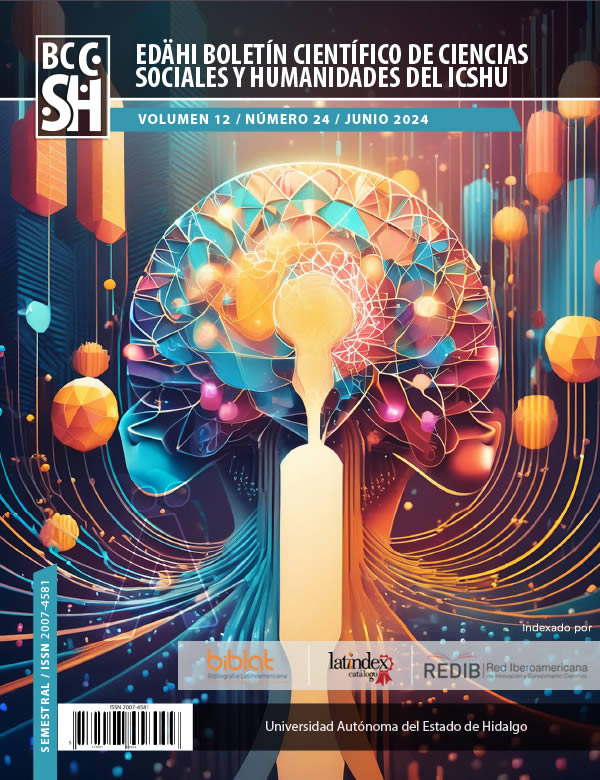Substantive representation of women in the Congress of Guanajuato: three legislatures in a context of parity
Abstract
The results presented here come from studying the substantive representation of women in the Guanajuato congress during two legislatures following the political-electoral parity reform of 2014, based on the analysis of the initiatives approved by opinion by type of promoters (female deputies, deputies, or parliamentary group) to identify issues in favor of women prioritized on legislative agendas. It was found that the interests of women are not a priority in the Guanajuato congress as none of the approved initiatives had the purpose of disrupting the gender regime on which institutions are built, including the congress itself. Besides the female deputies, the Parliamentary groups also represent women's interests.
Downloads
References
Baez Carlos, Adriana (2021). «Avanza el modelo de democracia paritaria en México.» Revista Mexicana de Análisis Político y Administración Pública Vol. X, núm. 2, 84-99. Disponible en: http://www.remap.ugto.mx/index.php/remap/article/view/369/282
Bedín, Paula (2019). «Representación política de las mujeres.» Estudios Sociales, 11-29.
Celis, Karen (2008). «Studying Women's Substantive Representation in Legislatures: When Representative Acts, Contexts and Women's Interests Become Important. » Representation vol. 44, núm. 2: 111-123. https://doi.org/10.1080/00344890802079516
Celis, Karen, Sarah Childs, Johanna Kantola, y Mona Lena Krook (2008). «Rethinking Women’s Substantive Representation. » Representation 44: 99-110. https://doi.org/10.1080/00344890802079573
Celis, Karen, y Silvia Erzeel. ((2015). «Beyond the Usual Suspects: Non-Left, Male and Non-Feminist MPs and the Substantive Representation of Women. » Government and Opposition. Núm.50: 45-64. https://doi.org.10.1017/gov.2013.42
Childs, Sarah, y Mona Lena Krook (2006). «Should Feminists Give Up on Critical Mass? A Contingent Yes. » Politics and Gender 2, nº 4: 522-530. https://doi.org/10.1017/S1743923X06061149
Congreso del Estado de Guanajuato. LXV Legislatura. s.f. https://www.congresogto.gob.mx .
Gasca Ramírez, Yajaira (2022). «Vencer resistencias: presupuesto para comunidad LGBT+ se hace realidad con amparo.» PopLab, 3 de septiembre de 2022.
Góngora Cervantes, Vanessa, Éctor Jaime Ramírez Barba y Plinio Manuel E Martínez Tafolla ((2019). «Presencia y representación de las mujeres en el Congreso del Estado de Guanajuato.» Nueva época. Revista de El Colegio de San Luis. vol. IX, núm. 20: 493-529.
Guzmán Rodríguez, Diana Esther, y Sylvia Cristina Prieto Dávila (2014). ¿Legislar y representar? La agenda de las senadoras en el Congreso (2006-2010). Bogotá: Centro de Estudios de Derecho, Justicia y Sociedad.
Heath, Roseanna Michelle, Leslie A Schwindt-Bayer, y Michelle M Taylor-Robinson (2005). «Women on the Sidelines: Women's Representation on Committees in Latin American Legislatures. » American Journal of Political Science. Vol. 49, núm. 2: 420-436.
Hernández García, Ma. Aidé (2022). La paridad, una realidad aún por construir en los congresos locales de México. Ciudad de México: Instituto Nacional Electoral.
Hernández García, Ma. Aidé (2023). Avances y desafíos en la construcción de la agenda de género en los congresos locales en México 2018-2022. Grañén Purrúa - Universidad de Guanajuato.
Jiménez Mayagoitia, Cutberto (2021). «Matrimonio igualitario en Guanajuato: asociación presenta amparo para que el Congreso lo vote.» am, 9 de diciembre de 2021.
Johnson, Nikki. «La Bancada Femenina en Uruguay: un «actor crítico» para la representación sustantiva de las mujeres en el parlamento.» América Latina Hoy 66 (2014): 145-165.
Kerevel, Yann Patrice, y Cassie Millet Knott (2017). «La disciplina partidista en el congreso local del Estado de México, 2012-2015.» En Los congresos en México: la representación política en el contexto de las reformas electorales, de Rosa María Mirón Lince, Ángel Gustavo López Montiel y Sergio Arturo Bárcena Juárez, 197-219. México: Universidad Nacional Autónoma de México, Instituto Belisario Domínguez del Senado de la República.
Loaeza, Soledad (1974). «El Partido Acción Nacional: la oposición leal en México.» Foro Internacional: 352-374.
Macaulay, Fiona J. (2005). «Cross-party alliances around gender agendas: critical mass, critical actors, critical structures or critical junctures? » Conference for Expert Group Meeting on equal participation of women and men in decision-making processes.
Organización de las Naciones Unidas. Derechos sexuales y reproductivos. s.f. https://hchr.org.mx/historias-destacadas/derechos-sexuales-y-reproductivos-2/ .
Piscopo, Jennifer M. (2014). «Beyond Hearth and Home: Female Legislators, Feminist Policy Change, and Substantive Representation in Mexico. » Revista Uruguaya de Ciencia Política. Vol. 23, núm. 2: 87-110.
Pitkin, Hanna (1985). El concepto de representación política. Madrid: Centro de Estudios Constitucionales.
Schwindt-Bayer, Leslie (2014). «Women’s representation in Latin American legislatures: current challenges and new directions. » Revista Uruguaya de Ciencia Política. vol. 23, núm. 2: 15-35.
Vázquez Correa, Lorena (2019). «Agenda de Género y Representación Sustantiva de las Mujeres. Apuntes de la Discusión Teórico-Metodológica.» X Congreso Latinoamericano de Ciencia Política. Ciudad de México.
Vázquez-Correa, Lorena (2023). «Paridad y representación sustantiva en el Congreso de Guanajuato: ¿Dónde estamos y hacia dónde vamos?» En Libro Programa Anual de Formación del Centro de Estudios Parlamentarios CEP 2022, de LXV Legislatura Congreso del Estado de Guanajuato, 323-351. Guanajuato.
Vidal-Correa, Fernanda (2022). «Feminist Agendas and Substantive Equality: From the Politics of Presence to Legislative Political Transformation. » En Vidal Correa Fernanda. Political Representation and Gender Equality in Mexico, pp. 133-151. Springer Nature.
Copyright (c) 2024 Leyla Chávez Arteaga

This work is licensed under a Creative Commons Attribution-NonCommercial-NoDerivatives 4.0 International License.













